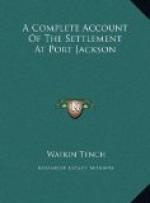But not to multiply arguments on a subject where demonstration (at least to me) is incontestable, I shall close by expressing my firm belief that the Indians of New South Wales acknowledge the existence of a superintending deity. Of their ideas of the origin and duration of his existence; of his power and capacity; of his benignity or maleficence; or of their own emanation from him, I pretend not to speak. I have often, in common with others, tried to gain information from them on this head; but we were always repulsed by obstacles which we could neither pass by or surmount. Mr. Dawes attempted to teach Abaroo some of our notions of religion, and hoped that she would thereby be induced to communicate hers in return. But her levity and love of play in a great measure defeated his efforts, although every thing he did learn from her served to confirm what is here advanced. It may be remarked, that when they attended at church with us (which was a common practice) they always preserved profound silence and decency, as if conscious that some religious ceremony on our side was performing.
The question of, whether they believe in the immortality of the soul will take up very little time to answer. They are universally fearful of spirits.* They call a spirit ‘mawn’. They often scruple to approach a corpse, saying that the ‘mawn’ will seize them and that it fastens upon them in the night when asleep.** When asked where their deceased friends are they always point to the skies. To believe in after existence is to confess the immortality of some part of being. To enquire whether they assign a ‘limited’ period to such future state would be superfluous. This is one of the subtleties of speculation which a savage may be supposed not to have considered, without impeachment either of his sagacity or happiness.
[* “It is remarkable,” says Cicero, “that there is no nation, whether barbarous or civilized, that does not believe in the existence of spirits".]
[**As they often eat to satiety, even to produce sickness, may not this be the effect of an overloaded stomach: the nightmare?]
Their manner of interring the dead has been amply described. It is certain that instead of burying they sometimes burn the corpse; but the cause of distinction we know not. A dead body, covered by a canoe, at whose side a sword and shield were placed in state, was once discovered. All that we could learn about this important personage was that he was a ‘Gweeagal’ (one of the tribe of Gweea) and a celebrated warrior.




